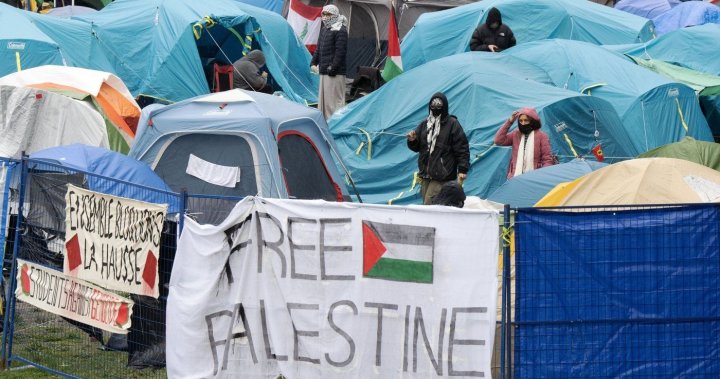A group of pro-Palestinian protesters have been camping at McGill University’s downtown Montreal campus for over a week, bringing attention to their cause in the midst of the Israel-Hamas conflict. The protesters have organized a small city within their encampment, complete with rainproof tents, a library, donated supplies, and makeshift wooden sidewalks to navigate the mud. They have been working together to weather the heavy rains by digging trenches and running a “free store” tent offering food, coffee, and rain gear to protesters.
Similar encampments have popped up at the University of Toronto, the University of Ottawa, and the University of British Columbia in Vancouver, inspired by protests at American campuses. While the activists are making their voices heard, opponents argue that the protests are illegal and are making some Jewish students feel insecure. Both McGill University and Premier François Legault have requested police assistance to remove the tents in Montreal. Despite the pressures to dismantle their camps, the protesters, including members of Independent Jewish Voices Concordia, remain adamant about continuing until their universities agree to divest from companies linked to Israel’s treatment of Palestinians.
The encampment at McGill has grown in size and organization, with members dedicating themselves to keeping the camp running effectively. Protester Ari Nahman describes the makeshift city as being well-equipped and prepared for the long haul. The protesters are determined to sustain their camp to put pressure on their universities to disinvest in companies supporting Israel’s military actions. The camp has been a focal point of pro-Palestinian activism and has drawn attention to the ongoing conflict in the region.
As the protest stretches into its second week, the McGill encampment continues to draw support and attention. The activists have created a significant presence on campus, with their tents and activities becoming a familiar sight to students and staff. The encampment has become a symbol of solidarity for pro-Palestinian supporters and a rallying point for those seeking change in university’s investment practices. Despite opposition and calls for dismantlement, the protesters are resolved to remain until their demands are met.
The encampment at McGill University is part of a broader movement of pro-Palestinian activism taking place on university campuses across North America. Inspired by similar protests in the United States, these demonstrations seek to raise awareness about the oppression faced by Palestinians and to pressure institutions to take action. By setting up camps and engaging in various activities, the protesters hope to bring attention to their cause and effect change on a larger scale.
The McGill encampment and others like it at Canadian universities represent a growing trend of student-led activism in response to global conflicts and human rights issues. These protests serve as a platform for marginalized voices to be heard and challenge institutions to rethink their investment practices. While facing opposition and controversy, the encampments highlight the power of grassroots movements in advocating for social justice and equality. The protesters’ determination and organization demonstrate a commitment to their cause and a willingness to stay the course until their demands are met.













